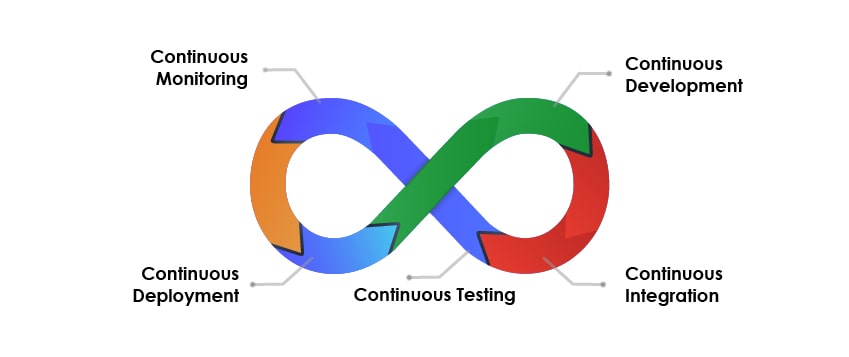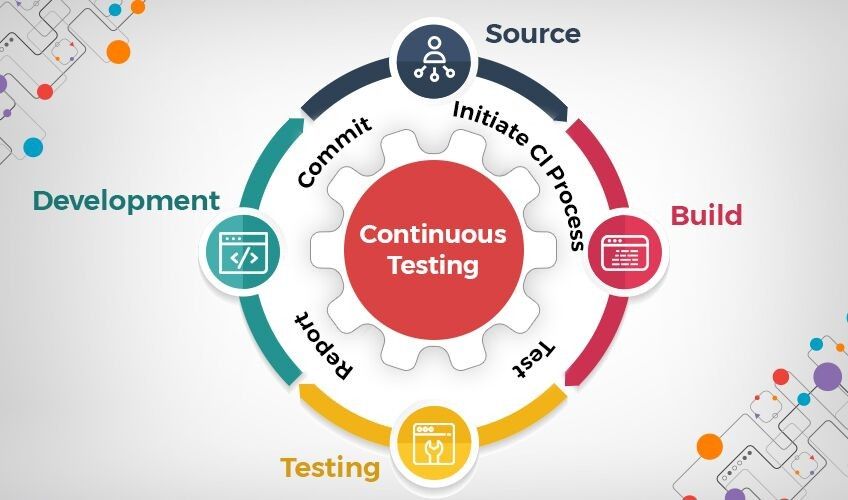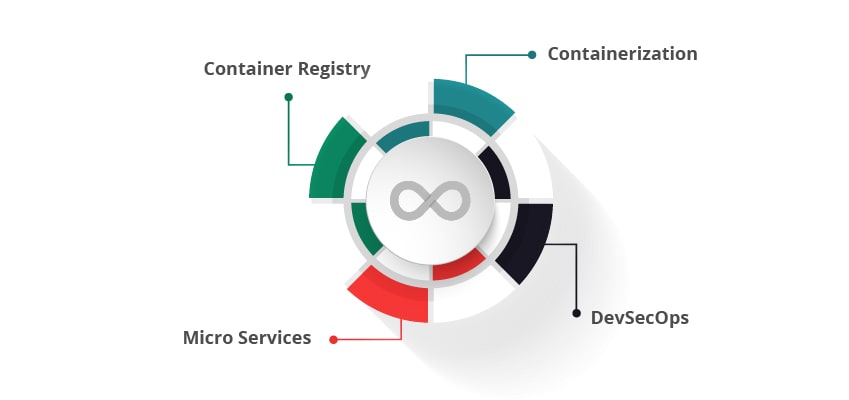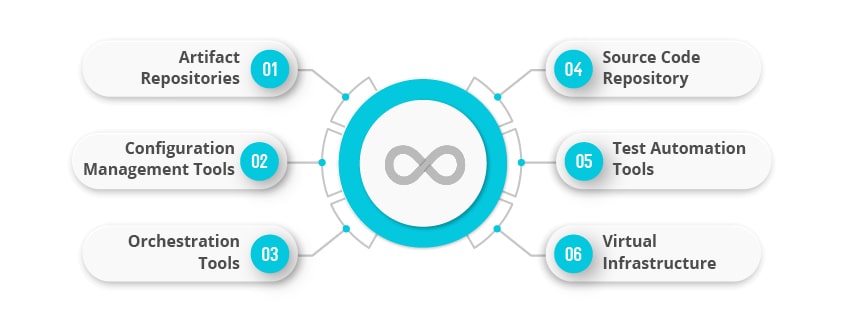Recommended Blogs
DevOps – A Detailed Overview for Businesses

What is DevOps?
DevOps is an evolution from the agile model and is an enterprise software development approach aimed at enabling collaboration between Development and IT Operations. This is an effective collaboration of people, process and working product that enables continuous integration (CI) and continuous delivery (CD) of value to end users.
This DevOps methodology ensures development and operations teams to improve collaboration and facilitates better coordination among them. Primarily, a DevOps engineer works with different IT teams such as operations, development and testing functions by automating and streamlining the CI/CD and deployment processes.
With this modern code deployment approach, the development team submits the application to the operations team for implementation; and the operations team monitors the application to provide the relevant feedback. This methodology helps to accelerate the application delivery by minimizing the risks with continuous delivery and delivers effective feedback with faster and quality releases.
Emergence of DevOps Methodology – ‘Better Collaboration Between Teams’
DevOps is popularly considered as a culture more than a methodology in software development. With the traditional waterfall model, it was difficult for the teams to meet the ever-changing demands of the new IT products with connected devices.
Though the software requirements were well-defined at the earliest, this sequential model failed to deploy the applications faster and could not give efficient results as software testing was done at the end of the development. This effectively lead to the evolution of Agile Methodology.
An agile model is an iterative approach to software development and it focuses on customer feedback, collaboration, and rapid releases. This methodology serves best to address the gaps and ensures good communication between the product owner and developer teams. Though there are many benefits with this model, however, development and operation teams still find some challenges that are well addressed in DevOps. This methodology ensures faster code deployment to production with faster releases and also ensures speed of application delivery with faster time-to-market.
Why Should Businesses Adopt DevOps?
Today’s businesses are moving towards DevOps to overcome the challenges of growing competition with ever-increasing user expectations. This methodology helps in breaking down the traditional silos and ensures speed and responsiveness to production with proper customer feedback. The DevOps practice essentially ensures frequent communication and collaboration between teams as they continue to work hand-in-hand.
With this software delivery approach, businesses can easily automate the regular IT operations with the code development process and combine the workflows of both the teams from the initial design phase till production.
Along with this DevOps, businesses are embedding many technologies such as blockchain infrastructure, distributed databases, Big Data analytics, serverless computing, etc. as businesses continue to shift towards digital business. Evidently, DevOps is the solution to run the businesses with rapid innovation, less time to market, and be sure to get quality applications.
Thus, the implementation of DevOps with the best workflow, test automation and effective practices helps businesses to achieve huge benefits. Some of the benefits include to enable better organizational culture, to enhance the software lifecycle predictability, along with saving considerable time and money by leveraging software test automation.
What are the Benefits of DevOps?
DevOps has emerged as a superior method to deliver quality software faster by decreasing the development lifecycle and maintaining business objectives.
Some of the benefits are:
1. Speed:
Assures and delivers the highest business value and faster delivery time with an effective software development process in place.
2. Improved Collaboration:
Enhances the collaboration between QA, Development and Operation teams with more engaged teams and breaks down silos.
3. Cross-Skilling:
Facilitates opportunity for cross-skilling and self-improvement of various teams.
4. Reliability:
Ensures better quality application updates and infrastructure changes which further ensures reliable software delivery at a more rapid pace.
5. Faster Bug Identification:
DevOps processes help identify and resolve the fixes at the earliest with faster identification of defects.
6. Release on Demand:
Assures to compete with present business market and customer needs with continuous releases and continuous deployments.
7. Manage at Scale:
Enables to operate and manage infrastructure and development processes at scale. It becomes far easier to manage and deploy and test through multiple environments for multiple teams.
8. Security:
DevOps model can be adopted without sacrificing security by using automated compliance policies and other configuration management techniques.
What are DevOps Lifecycle Phases?

The lifecycle of DevOps works involves various stages such as continuous development, continuous integration, continuous testing, and continuous deployment.
1. Continuous Development:
This phase focuses on the planning and coding of the application. The vision of the project is decided and then the code is developed for the application. There is no restriction for the code language, thus the code can be in any language. Once the code is developed, it is moved to the next continuous integration phase.
2. Continuous Integration:

In this stage, the developer frequently commits changes to the source code. And, the new code that supports the latest functionalities is continuously integrated with the source code. As the development is continuous, it becomes essential to integrate and update the code continuously. This specific way of continuous integration helps to achieve the changes faster.
3. Continuous Testing:
In this stage, the developed software is constantly tested with the help of Test automation tools to identify defects. This implies running existing regression suites and continuously adding test cases to that in order to cater to the new functionalities being added. It helps in ensuring that there are no functionality breaks while new features are being added.
4. Continuous Deployment:
In this stage, configuration management tools and/or containerization tools are used to deploy to the test or production infrastructure. Configuration management tools help to establish and maintain the app’s functional and performance requirements. Specifically, containerization tools help to manage consistency in development, test, and production environments. With the help of these tools, the code is deployed on the test/production servers in this phase..
5. Continuous Monitoring:
This is the last stage in the DevOps lifecycle, and in this stage, the performance of the software is constantly monitored. The errors related to functionality, low memory, and app performance are effectively monitored with the help of continuous monitoring tools. This may also involve using Infrastructure monitoring tools provided by individual Cloud providers.
Related Technologies and Practices

Containerization:
Containerization involves the packaging of application along with its libraries, frameworks, and configuration files together such that it can be run in various environments. Today, Docker is the most popular platform that provides for containerization. Containers are becoming an integral part of standard DevOps architecture. DevOps and Docker image management technologies have made it easy for developers and IT operation teams to share software and collaborate easily which further leads to enhanced productivity.
DevSecOps:
Security is an ever-existing requirement for businesses. DevSecOps is the integration of Security testing within the DevOps framework. Thus with DevSecOps, security will be infused throughout the software development lifecycle thus eliminating vulnerabilities as soon as possible in the software life cycle.
MicroServices:
Microservices are often concomitant technology. With micro-services, it is easier for the DevOps teams to increase the speed and agility as individual teams can focus on single functions. Also, micro-services protect the elements from breakage, isolate the defects, and help in fixing them.
Container Registry:
This technology has also become a crucial need for the DevOps teams while working with microservices and containerized applications. The container registry is the collection of repositories that helps in storing container images. A few of the top container registries are Docker Hub, Azure Container Registry and Google Container Registry.
What are the Tools Used in DevOps?
Some of the commonly used tools in DevOps have been divided into different categories and mentioned in alphabetical order:

1. Artifact Repositories:
These are repositories of binaries, libraries, DLLs, third party components that may be built using internal or external source code repositories. Some of the commonly used tools in this category are JFrog Artifactory, Nexus Repository.
2. Configuration Management Tools:
This category includes the provisioning and configuration of a server or an environment. It involves the practice of provisioning infrastructure, managing and automating the configurations of various software applications. Some of the tools that come under this category are ansible, terraform, Saltstack, Packer.io.
3. Orchestration Tools:
Orchestration involves automating workflow processes to build, test, deliver and deploy software services. These may be tools installed and managed by the software development teams themselves or maybe SaaS (Software as a Service) based tools. Some of the common tools under this category are Jenkins, CircleCI, Azure DevOps etc.
4. Source Code Repository:
This source code repository refers to the place or hub where the developer’s check-in and change code. This repository effectively manages the versions of the code that are checked in by the developer teams. The tools may be central repository based or more often distributed version control systems. Some of the commonly used tools that come under this category are git, Subversion, and TFS.
5. Test Automation Tools:
An important aspect of DevOps is integration with automated testing within the pipeline. Automated testing ensures faster releases and at the same time delivers quality. Some of the popular tools that come under this category are AccelQ, Tricentis Tosca, Selenium.
6. Virtual Infrastructure:
There are many cloud vendors (Amazon, Microsoft, Google) that sell infrastructure or Platform as a Service (PaaS). The cloud vendors make available APIs that allows programmatically creating new virtual machines or other infrastructure components using some configuration management tools already mentioned above. Some of the service providers under this category are Amazon Web Services (AWS), Microsoft Azure, Google Cloud Platform (GCP).
Role of DevOps Engineer
DevOps is gaining steady demand in IT organizations. The combination of ‘development’ and ‘operations’ is proving to be a huge success. DevOps is contributing to swift software development along with improved team collaboration and efficiency.
The DevOps teams with DevOps engineers perform many activities and ensures faster and quality releases along with ensuring the early market of the product.
The role of the DevOps Engineer is as follows:
– The need for having decent soft skills are critical for a DevOps engineer. As a mediator between the development team and operations team, they communicate with the teams and helps solve problems if any through the support of other team members
– DevOps engineers have the good technical know-how on certain key tools that fall under source control version, continuous integration, infrastructure automation, deployment automation and containerization and thus helps DevOps teams in enabling quality releases
– The DevOps engineer helps develop specific security mechanisms that not only monitor the on-going activities but also safeguard the system infrastructure from any potential threats.
– A DevOps engineer helps in handling automation tools. It becomes the responsibility of the DevOps engineer to coordinate with teams at any point right from the requirements gathering stage till the deployment stage. Infrastructure also needs to be automated with the help of the specific DevOps teams
– Apart from automation, a DevOps engineer is responsible for implementing testing techniques. The main reason being automation and testing are interlinked, and hence it becomes essential for the DevOps engineer to handle the automation and testing activities to ensure faster releases and at the same time quality releases.
Conclusion
DevOps has evolved as an extension of agile methodology and enables effective collaboration between developers and IT operation teams and breaks silos that existed in earlier models. DevOps methodology has many benefits such as ensures team collaboration, speed of delivery, reliability, security ensured with effective test automation practices.
DevOps facilitates modern enterprises to maintain consistency, to innovate rapidly, deliver customer-centric software with enhanced time-to-market. TestingXperts can provide DevOps consulting and implementations services so that you can do an effective rollout of this methodology in your organization.
Related Queries on DevOps
FAQs
DevOps is an evolution from the agile model and is an enterprise software development approach aimed at enabling collaboration between Development and IT Operations.
Some of the commonly used tools in DevOps are test automation tools, Configuration Management Tools, Virtual Infrastructure tools
DevOps framework enhances the collaboration between QA, Development and Operation teams with more engaged teams and breaks down silos.
Discover more

